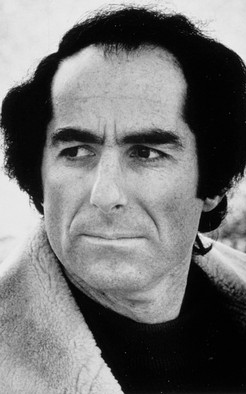
The Human Stain is a novel by Philip Roth, published May 5, 2000. The book is set in Western Massachusetts in the late 1990s. Its narrator is 65-year-old author Nathan Zuckerman, who appears in several earlier Roth novels, including two books that form a loose trilogy with The Human Stain,American Pastoral (1997) and I Married a Communist (1998). Zuckerman acts largely as an observer as the complex story of the protagonist, Coleman Silk, a retired professor of classics, is slowly revealed.

Philip Milton Roth was an American novelist and short-story writer. Roth's fiction—often set in his birthplace of Newark, New Jersey—is known for its intensely autobiographical character, for philosophically and formally blurring the distinction between reality and fiction, for its "sensual, ingenious style" and for its provocative explorations of American identity. He first gained attention with the 1959 short story collection Goodbye, Columbus, which won the U.S. National Book Award for Fiction. Ten years later, he published the bestseller Portnoy's Complaint. Nathan Zuckerman, Roth's literary alter ego, narrates several of his books. A fictionalized Philip Roth narrates some of his others, such as the alternate history The Plot Against America.
Swede or Swedes may refer to:
Nathan Zuckerman is a fictional character created by the writer Philip Roth, who uses him as his protagonist and narrator, a type of alter ego, in many of his novels.

The Plot Against America is a novel by Philip Roth published in 2004. It is an alternative history in which Franklin D. Roosevelt is defeated in the presidential election of 1940 by Charles Lindbergh. The novel follows the fortunes of the Roth family during the Lindbergh presidency, as antisemitism becomes more acceptable in American life and Jewish-American families like the Roths are persecuted on various levels. The narrator and central character in the novel is the young Philip, and the care with which his confusion and terror are rendered makes the novel as much about the mysteries of growing up as about American politics. Roth based his novel on the isolationist ideas espoused by Lindbergh in real life as a spokesman for the America First Committee, and on his own experiences growing up in Newark, New Jersey. The novel received praise for the realism of its world and its treatment of topics such as antisemitism, trauma, and the perception of history. The novel depicts the Weequahic section of Newark which includes Weequahic High School from which Roth graduated. A miniseries adaptation of the novel aired on HBO in March 2020.

Upsala College (UC) was a private college affiliated with the Swedish-American Augustana Synod and located in East Orange in Essex County, New Jersey in the United States. Upsala was founded in 1893 in Brooklyn, New York City, and moved to Kenilworth, and finally to East Orange in 1924. In the 1970s, Upsala considered moving to Wantage Township in rural Sussex County as East Orange's crime problem magnified and social conditions deteriorated. However, the college administration and trustees chose to remain committed to East Orange. Declining enrollment and financial difficulties forced the school to close in 1995.

I Married a Communist is a Philip Roth novel concerning the rise and fall of Ira Ringold, known as "Iron Rinn." The story is narrated by Nathan Zuckerman, and is one of a trio of Zuckerman novels Roth wrote in the 1990s depicting the postwar history of Newark, New Jersey and its residents.

Weequahic Park is a park located in the South Ward of Newark, New Jersey, USA, designed by the Olmsted Brothers firm,. The park is 311.33 acres including an 80-acre (320,000 m2) lake.
Weequahic High School is a four-year comprehensive public high school serving students in ninth through twelfth grades, located in the Weequahic section of Newark in Essex County, in the U.S. state of New Jersey. The school is operated by the Newark Public Schools and is located at 279 Chancellor Avenue. The school has been accredited by the Middle States Association of Colleges and Schools Commission on Elementary and Secondary Schools since 1935.
Max Lewis Ehrich is an American actor, singer, and dancer.

Nemesis is a novel by Philip Roth published on October 5, 2010, by Houghton Mifflin Harcourt. It is Roth's 31st book, "a work of fiction set in the summer of 1944 that tells of a polio epidemic and its effects on a closely knit Newark community and its children." In 2012, Philip Roth told an interviewer that Nemesis would be his last novel.
This is a bibliography of works by and about Philip Roth.
Heart of Stone is a 2009 documentary film about Weequahic High School in Newark, New Jersey, the United States, directed by Beth Toni Kruvant, with Zach Braff serving as executive producer. The film relates the struggles of Principal Ron Stone and the rest of the school's administration, plus students and alumni to return the school, working with African American and Jewish alumni, to its previous glory in the years before the 1967 Newark riots.
Seymour "Swede" Masin was a high school and college athlete of great versatility. He briefly played professional basketball in the American Basketball League, a precursor to the National Basketball Association.
Miss America 1949, the 23rd Miss America pageant, was held at the Boardwalk Hall in Atlantic City, New Jersey on September 10, 1949. The 1949 pageant marked the first time that a public official, New Jersey Governor Alfred E. Driscoll, had taken part in the coronation, placing the jeweled crown on the new queen's head.

Weequahic is a neighborhood in the city of Newark in Essex County, in the U.S. state of New Jersey. Part of the South Ward, it is separated from Clinton Hill by Hawthorne Avenue on the north, and bordered by the township of Irvington on the west, Newark Liberty International Airport and Dayton on the east, and Hillside Township and the city of Elizabeth on the south. There are many well maintained homes and streets. Part of the Weequahic neighborhood has been designated a historic district; major streets are Lyons Avenue, Bergen Street, and Chancellor Avenue. Newark Beth Israel Medical Center is a major long-time institution in the neighborhood.
Seymour Bernstein is an American pianist, composer, and teacher. He is the subject of the documentary Seymour: An Introduction directed by the actor Ethan Hawke. Hawke describes Bernstein as a mentor figure.

American Pastoral is a 2016 American crime-drama film directed by Ewan McGregor and with a screenplay by John Romano, based on the 1997 novel of the same name by Philip Roth. The film stars McGregor, Jennifer Connelly, Dakota Fanning, Peter Riegert, Rupert Evans, Uzo Aduba, Molly Parker and David Strathairn. Principal photography began on September 21, 2015, in Pittsburgh.
The history of Jews in New Jersey started with the arrival of Dutch and English traders and settlers in the late 1600s. According to the Berman Jewish DataBank's 2019 survey, New Jersey is the state with the fourth highest total population of Jews at 545,450, and is also the state with the third highest percent of Jews at 6.1%. This means that New Jersey is home to 7.8% of the American Jewish population.









